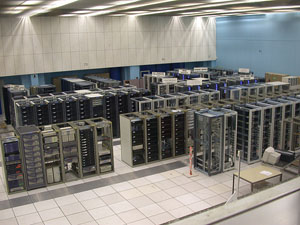Keeping Your Data Safe and Mobile
- published
- 2008-12-14

CERN Computing Center Data in the internet era. Photo courtesy of Skimaniac
For most of the history of personal computing, people have been storing their personal data locally on their computer's hard drive. Documents, email, music, video, photos, and ebooks all resided on a single hard drive in a computer at a fixed location. There are two major issues with this setup. The data is not safe because it could all be lost if the hard drive fails, and the data is not mobile because you need to be in front of that particular computer in order to access it. A laptop increases the mobility of the data, but it also decreases the safety of the data because laptops are more easily stolen or lost. Fortunately, today we have online services and high capacity flash drives to help solve these problems.
My strategy is to remove my personal data from my hard drive so that my laptop will effectively be like a public workstation. That way, if I lose it, I know that I haven't lost much and my personal data will not be publicly exposed.
I have configured all of my email accounts to forward to a gmail account. That way gmail archives both my incoming and outgoing mail and it is accessible from anywhere with internet access. I also have a paid hosting service that provides storage for all my websites and wiki systems. Rather than taking notes in text files on my laptop, I add them directly to an online wiki, which has numerous benefits. First, the hosting company handles backups for you. You can also easily download a zipped backup file from the host to make sure your data is safe even if the company goes out of business. I do this periodically and burn the file to a DVD. A wiki also makes it easy to add hyperlink references between your notes, which encourages better organization. You can also access it from anywhere with an internet connection. I have my private wikis password protected so that only I can access them. On my laptop, the password is stored so that I never have to type it in when writing from my computer. And wikis are great because you can share them with others so that multiple users can contribute to the same collection of notes. The wiki software that I use is called LionWiki, which I like because it is very simple to use and easy to install.
With my notes, websites, and email handled by online services, I still need to store my other documents somehow. For music, ebooks, and recent personal documents I use a compact 16GB keychain flash drive that I bring with me everywhere. Any personal data on the flash drive is encrypted with TrueCrypt so I don't have to worry about anything if I lose it. Periodically, I archive the files on the flash drive to a USB hard drive that I keep in a safe place at home and on DVDs that I store away from home. That way I have quick access to the archive from the external hard drive, but they are also safe on the DVDs even if my house is destroyed.
Though I haven't fully finished implementing this system, I expect that it will improve my efficiency in dealing with my data.